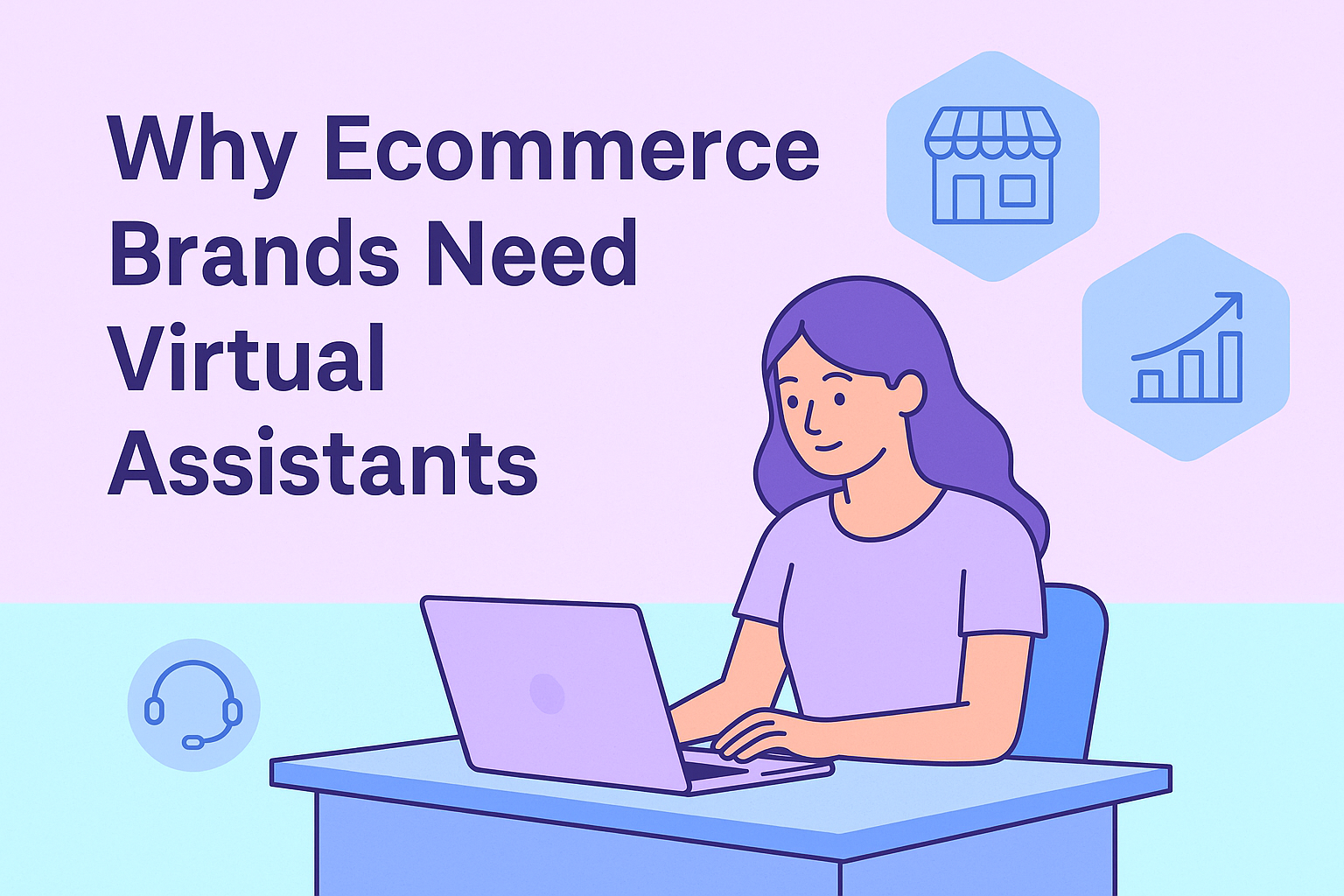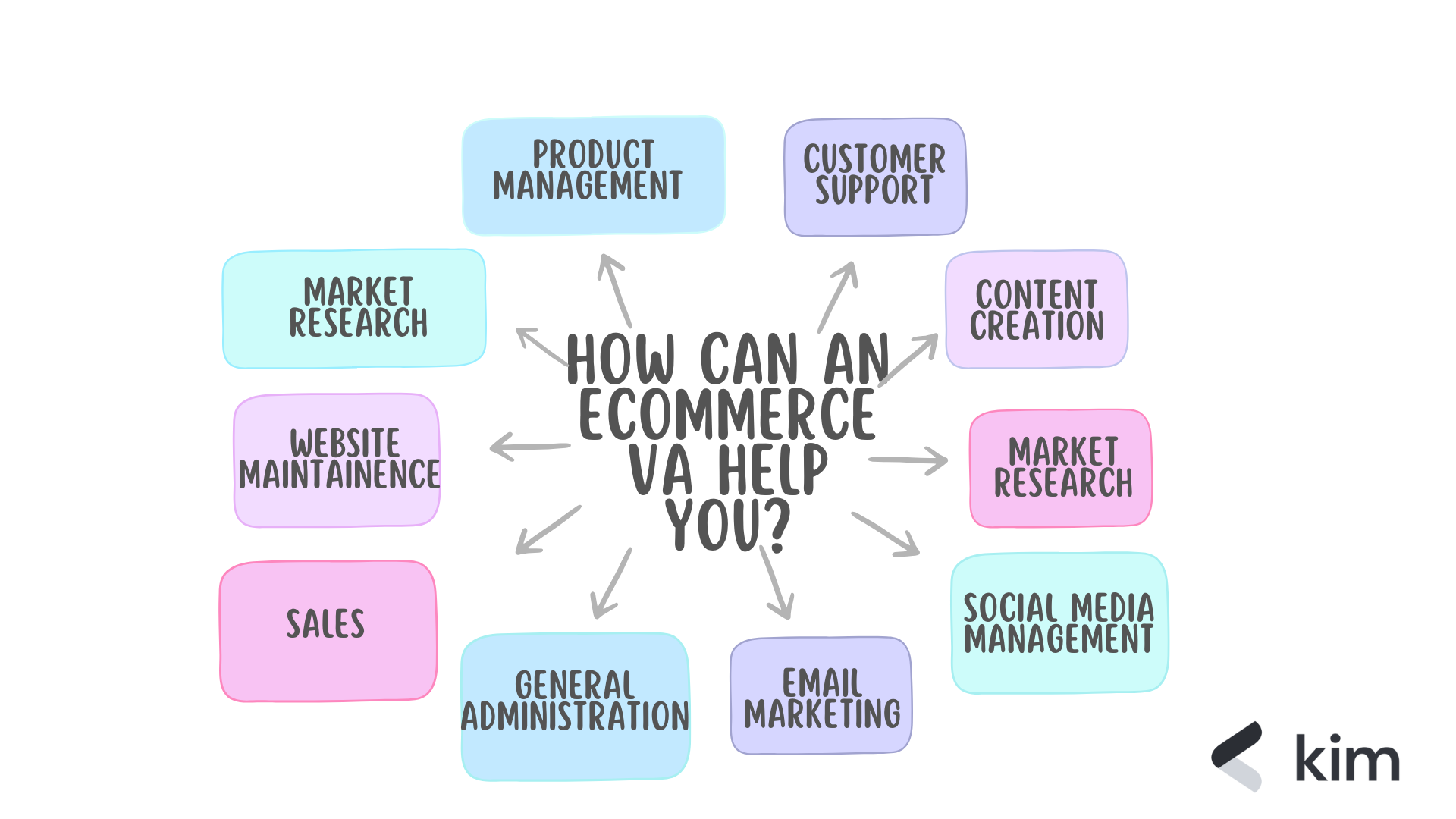Ecommerce Virtual Assistants: The Secret Growth Partner Online Stores Can’t Afford to Ignore

Running an online store is exhilarating, but let’s be real, it’s also exhausting. Between juggling customer inquiries, managing inventory, processing orders, updating product listings, and keeping up with marketing campaigns, even the most passionate entrepreneurs hit a breaking point.
The truth is: as your business grows, so does the complexity of running it. What used to feel manageable becomes overwhelming. And while automation helps, there’s still a huge demand for human support to ensure things run smoothly.
That’s where Ecommerce Virtual Assistants (VAs) step in. These skilled professionals aren’t just task-doers, they’re strategic partners who take the load off your shoulders so you can focus on scaling. Whether it’s handling customer support tickets, optimizing product listings, or managing marketing campaigns, Ecommerce VAs give founders back their most valuable resource: time.
Why Ecommerce Brands Need Virtual Assistants
Every successful ecommerce entrepreneur eventually realizes the same truth: growth stalls when the founder is buried in repetitive work.
Without support, this leads to:
- Burnout: Constant multitasking drains energy and focus.
- Errors and Oversights: Manual processes create mistakes in inventory, orders, and listings.
- Missed Opportunities: Time spent on admin work is time not spent building partnerships, launching new products, or testing ads.
According to a 2023 ecommerce survey, small business owners spend over 50% of their day on administrative tasks, leaving only half for growth-focused work.
Consider a Shopify store owner who sells handmade skincare products. Each day, they:
- Answer questions like “Has my order shipped?”
- Update product descriptions when stock changes.
- Monitor Instagram comments.
- Track inventory in spreadsheets.
By the end of the day, there’s no time left to explore trending ingredients, negotiate influencer partnerships, or test TikTok ads.
Hiring a VA changes everything.
Instead of being the bottleneck, the founder becomes the strategist. Instead of firefighting, they’re focused on growth.

What Is an Ecommerce VA?
An Ecommerce Virtual Assistant is a remote professional trained to manage the day-to-day operations, customer support, and marketing tasks of online stores.
But the best VAs aren’t just assistants. They’re growth partners—flexible, skilled, and capable of adapting to your store’s evolving needs.
Key Roles Ecommerce VAs Play
Not all VAs are alike. Some specialize in customer support, others in backend operations, while many focus on marketing. Here’s a breakdown of how they fit into an ecommerce business:
1. Customer Support Specialists
Customer support is a revenue driver, not a cost center. Studies show that companies responding to inquiries within 1 hour are 7x more likely to convert the sale.
VAs trained in support can:
- Manage email, live chat, and social media messages.
- Handle refunds, exchanges, and complaints.
- Proactively follow up with buyers to request reviews.
- Spot recurring issues and share insights with the business.
Example: A sustainable fashion store hired a VA to handle all customer inquiries across email and Instagram. Within 3 months:
- Response time dropped from 24 hours to under 2 hours.
- Return-related complaints fell by 40%.
- Positive reviews mentioning “fast support” increased, boosting trust and conversions.
2. Operations & Product Management VAs
Behind-the-scenes operations make or break an ecommerce brand. Errors in product listings or inventory management directly hit customer experience.
These VAs can:
- Upload products with SEO-friendly descriptions and high-quality images.
- Monitor stock levels to avoid overselling.
- Update order statuses and coordinate fulfillment.
- Track supplier performance and shipping delays.
Example: A fitness gear brand hired a VA to manage inventory and orders. Within 3 months:
- Backend errors dropped 50%.
- Orders shipped 2 days faster on average.
- The founder finally had bandwidth to launch influencer campaigns, boosting monthly sales by 25%.
3. Marketing-Focused VAs
Ecommerce success depends on visibility. A marketing-focused VA handles execution so founders can focus on strategy.
Tasks include:
- Managing social media calendars.
- Scheduling posts and monitoring engagement.
- Running email campaigns.
- Conducting competitor research.
- Tracking analytics to measure ROI.
Example: A candle store brought in a VA for email marketing. By creating automated seasonal campaigns and consistent follow-ups, peak-season sales grew 25% year-over-year.
4. Analytics & Insights VAs
Some VAs specialize in data:
- Compiling reports on sales, traffic, and conversions.
- Identifying customer FAQs that should become website content.
- Spotting high-returning products or best-selling categories.
These insights help brands pivot faster and double down on what works.
Customer Support & Operational Efficiency: The Core Value of VAs
The biggest impact VAs bring to ecommerce businesses lies in:
- Customer satisfaction → driving retention & loyalty.
- Operational efficiency → reducing errors & saving time.
Together, these two areas fuel scalable growth.
Instead of juggling 100 tiny tasks, founders can focus on:
- Expanding to new markets.
- Testing new products.
- Building brand partnerships.
Put simply: a VA transforms chaos into structure.
Comparison Snapshot
| Platform | Best For | Key Strength | Example Result |
|---|---|---|---|
| eComVA | Store Operations | Shopify/WooCommerce focus | +18% revenue |
| MakkPress | Marketing Campaigns | Flexible & project-based | +25% sales |
| SupportHire | Customer Support | Ticketing & automation | +30% CSAT |
FAQs About Ecommerce Virtual Assistants
1. What tasks can an ecommerce VA handle?
Everything from customer support and order management to marketing campaigns and analytics.
2. How much does hiring a VA cost?
Rates vary depending on specialization, but they’re often 50–70% cheaper than hiring in-house staff. We explain the numbers in depth in this guide to VA pricing
3. What’s the difference between a VA and an employee?
VAs are remote, flexible, and hired on demand, making them cost-efficient and scalable.
4. Which ecommerce platforms do VAs support?
Most VAs are trained in Shopify, WooCommerce, Magento, BigCommerce, and Amazon Seller Central.
5. How do I choose the right VA platform?
Consider your biggest pain point: operations, marketing, or support. Then pick a provider that specializes in that area.
Conclusion & Call to Action
Running an ecommerce store without support is like rowing upstream, you’ll always feel behind. Virtual Assistants free you from repetitive tasks, enhance customer support, and streamline backend operations so you can focus on what matters: growth.
The cost of not hiring a VA? Burnout, errors, and missed opportunities.
Your store doesn’t just need an assistant. It needs a growth partner. And the right Ecommerce VA could be the smartest investment you make this year.
Ready to scale smarter? Hire your Ecommerce VA today and turn support into growth.